An objective assessment of the two alternative approaches leads me (Chuck Anderson) invariably towards the formal route. Why? Because without guidance, there is a tendency to go in circles, What do you practice, when do you move to the next topic? When are you doing something wrong? How do you practice what doesn't exist to you?— Chuck Anderson.
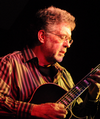
Here are some great Resources & Links, right here on Learning Ukulele with Curt for answering the questions to What Do I Study?
when going it alone or with a teacher.
Getting Started Series of `Ukulele Lessons • This series of lessons is intended to take a beginning ukulele player, just Getting Started through the basics.
Learning the `Ukulele - The Top Ten • regardless of the resources you use to learn to play any instrument, it's important to know what there is to learn and how that affects what you want to do.
What Level Player Are You? • You might be a beginner in one aspect of your learning and intermediate or advanced in other areas. This is especially true if you have experience playing other instruments, or have focused on one aspect of your playing.
The Elements of a Successful Music Program • Few Of The Elements That Would Be Typically Covered In A Well Rounded Musical Education.
The Study of Music Today • There is a lot of information available that is just wrong, so try to consult a legit expert on the subject. Don’t assume that the information is correct because it’s in a magazine or on-line. Magazines are notorious for featuring well-known players who can’t teach. They often have a very fuzzy idea of what they’re doing and what to call specific scales, chords, and techniques.
- Chuck Anderson
Glossary of Terms • a list of musical terms that are likely to be encountered in printed scores, music reviews, program notes, and when communicating with your fellow musicians.
3 Ways to Study with Curt • Private In-Person – One-on-One Lessons and One-on-One Virtual Lessons if you can't make it to Pennsylvania, USA, or Lessons via Email Correspondence.
It's All About Learning Songs • Using songs for learning to play the ukulele is the most common approach to — well — learning to play a song. Simply repeat the proccess for each song.
 “The self-taught man seldom knows anything accurately, and he does not know a tenth as much as he could have known if he had worked under teachers; and, besides, he brags, and is the means of fooling other thoughtless people into going and doing as he himself had done.” — Mark Twain
“The self-taught man seldom knows anything accurately, and he does not know a tenth as much as he could have known if he had worked under teachers; and, besides, he brags, and is the means of fooling other thoughtless people into going and doing as he himself had done.” — Mark TwainFinding a good ukulele teacher can be a daunting task, especially in the Internet age with immediate access to information online, FREE YouTube lessons, forums, Meetup groups, local ukulele clubs, etc. Let alone your local music store, which has no shortage of guitar teachers purporting to know the ukulele and offer ukulele lessons.
Unfortunately, there are no oversights or organizations that regulate private music teachers. This is especially true for private guitar and ukulele teachers. Anyone can hang a shingle out advertising private lessons or put content online. So finding a good teacher can be a challenge.
You are not so interested in a teacher's performance experience; I'd be more inclined to know their teaching experience. Remember, you're not hiring them for a gig, a performance, or to entertain you. You're asking them to help you learn the ukulele and music. Not all great players are great teachers — in fact, just because they can perform on an instrument, that doesn't always mean they can effectively communicate the process and skills for you to achieve the same results.
Here are a few questions you can ask prospective teachers and, generally speaking, what their answers should be. I'll also input my perspective, which should give some info on accurately evaluating a potential teacher or online content.
What is the teacher's experience? How long have they been teaching? Who were their teachers? What styles of music do you teach? How many students do they have, and how long does a student remain with them? Are the lessons customized to your goals? Are the lessons private or in groups? How are lessons structured? What materials do you use? What do I need for lessons? How is payment structured?
As you can see, there is a lot to ask, and the typical student I've encountered never asks even a small percentage of them. I'll address each question and what my response would be, as well as teacher responses that should throw up a red flag for you.
A teacher's experience, as with any job experience, is obtained over time. As well as the number of students they have and have taught. A private music teacher gains knowledge and experience on the job. It's not in a how-to book or in a college course — which I've never even heard of for private teaching anyway. A teacher learns by actually doing — at a minimum—3 to 5 years of teaching experience and not 5 to 10 students a week, more like 20 to 30 or more students a week. The more students a teacher teaches every week, the more experience they gain. Personally, I continually refine, research, and polish my teaching skills and have maintained 40 to 60 students a week or more, depending on the time of year. An excellent guideline is to find a teacher where the majority of the income comes from teaching, not performing. Maintaining a consistent private teaching practice shows a level of commitment to teaching, not that it's a sideline. There are multiple ways to make a living with music and the music business beyond performing.
Find a local performer that you admire. Search out their teacher, the teacher of that teacher, etc. Remember, just like in professional sports, the best coaches are not necessarily the best players. It's one thing to be able to do it, and another to explain and teach others to do the same.
You'll make the best progress with private one-on-one lessons and coaching. These private lessons can be in-person or via the Internet via video services like Skype, Zoom, Apple FaceTime, or a correspondence lesson program using email. Unless you're a total beginner and merely looking for an overview or just shopping, stay away from group lessons. However, group lessons, workshops, and seminars are a great way to supplement your private teaching.
Be sure to ask this question before a prospective teacher asks what styles of music you would like to perform.
A teacher should be honest about the types and styles of music they teach, and not a jack-of-all-trades teacher. Search out a teacher who is an expert in the particular styles of music you would like to play. My response to a student wanting to learn classical guitar is: I can help with the music principles, the technique, but I have no experience with the repertoire or the business side of that genre. The classical guitar has a specific repertoire required for players intending to perform.
When I first meet a prospective student, I tell them their lessons, customized one-on-one lessons, are based on their goals and experience. It includes a core foundation of the principles of music that all musicians for any instrument get, and builds on that foundation depending on their short- and long-term goals. It includes work on the technical issues inherent with actually getting the instrument to sound good consistently. For guitar and ukulele students, it's getting the hands to cooperate and consistently perform what is required. You are looking for an efficient, low-maintenance technique that you can call on at any time to get your desired musical results.
“Jazz” and “Classical” music are areas where a dedicated teacher specializing in that genre is most beneficial. Naturally, there are fewer specialists in these styles. A good jazz guitar teacher should be able to help you with the non-technical aspects of your study of the ukulele. An excellent classical guitar teacher can help with the technical, traditional Classical fingerstyle part of the ukulele.
NOTE: You do not have to study with only one teacher at a time. A good teacher would not be offended if you studied with other teachers at the same time.
Cost shouldn't always be a deciding factor in selecting a teacher, but the adage “You get what you pay for” is still valid in most situations. In-demand, teachers will command higher rates because of the demand for their services. As a teacher, rates can be a way to filter out less committed students. The price of lessons in my area ranges from $20 for thirty minutes to $100 an hour.
If a teacher answers this question without knowing your musical knowledge, your technique, or your musical goals, and tries to explain how he or she will teach you, then this is not a competent teacher. I tell students that the lessons are custom lessons based on their goals. It's as simple as that. They are private lessons, and each student is different, and lesson material evolves as students progress and their goals change and evolve. Each lesson contains specific tasks geared toward those goals.
If the teacher — especially for guitar and using a pick—does not go over a specific way to hold the pick, run for the door. It's not just doing what is comfortable or natural. Few things come naturally on most instruments. For both ukulele and guitar students, the fretting hand thumb has a specific role, and a teacher should cover that. Music is both an art and a science. Applying the principles of music to the ukulele is no different. Learning efficient techniques is an essential part of learning the ukulele. Technique is the one area where many teachers don't even address these most important aspects of playing. You'll never be any better than your actual physical ability to execute what you want to perform musically and technically. Doing what feels natural is typically not the most efficient or easy to maintain. The goal is to get your technique to sound and feel natural to you.
Equating students' success to the success of a teacher is only a good indicator if that student started with that teacher as a beginner. You can, however, ask successful performers who they studied with, and if one teacher's name keeps popping up, that might be a good indicator for that teacher. I'm sure there are one or two teachers in your area that their names would keep popping up when talking to other students and professional musicians. I was lucky, in the early years, to have several great teachers in Franny Boyle and Paul Byrne (passed July 24, 2021). And, then Chuck Anderson's name kept popping up, and I finally started studying with Chuck and credit Chuck with my success. Of course, I, did all the actual work, with Chuck's guidance.
Just because someone is a good player, do not assume they are good teachers. Teaching is the ability to develop and nurture students and help them achieve their goals and develop their voice as a player. Not play like their teacher. I know numerous excellent players that are not good teachers. Early in my development as a teacher and musician, I was very fortunate to hook up with a few good teachers and ultimately with Chuck Anderson, one of the best teachers in the area if not the USA. Chuck has developed an international reputation as an educator, teacher, and performer.
Here are a few requirements to look for in a teacher:
- Pedagogy is a big word, but it basically means learning how to teach. I studied how to teach various areas of a typically well rounded study of music and techniques, such as music theory, ear training, songwriting, improvisation, etc. I learned how to deal with various personality types. Everyone learns in different ways, and a teacher needs more than one way to teach. It is important for a teacher to understand this process. A good teacher can present the same information in several ways so that they will be better able to teach all of their students well.
- Recording: As you get more proficient, you might want to record yourself, and with recording in a home studio being more affordable than ever, a good teacher should be able to help with that. Recording yourself is also a good way to track progress.
- The Music of Business: There is more than one way to make money as a musician. A good teacher will be able to help with that as well.
This should give you some insight into finding a good and qualified teacher. Whether it is face-to-face or online, the search for a qualified teacher is well worth it.
It can take a bit to find a qualified, good teacher, as the best teachers typically do not advertise. There are several sources for finding a private, face-to-face teacher. Contact the music departments of colleges and universities near you. They can refer you to qualified teachers. Your local music store is one place to check, but they typically don't have the highest standards for selecting their guitar teachers, and even worse for ukulele teachers. Just because you can play guitar and most skills will transfer — the ukulele is really a different instrument with specific challenges, and you deserve to find a dedicated ukulele teacher.
Use all the questions from this article to help you find a teacher. A good teacher will not mind any of these questions. It shows your dedication to developing as a musician on your selected instrument. And, a good teacher will appreciate these questions and not mind any of the questions. I don't and a good teacher will not mind you studying with multiple teachers.
For online lessons, ask all the same questions, and your search can be worldwide. All the same issues and questions apply to online and virtual lessons as well as in-person face-to-face lessons. The online lessons I offer are not a course; they are a custom lesson program for the individual student.
Private, one-on-one lessons are entirely different from group instruction and workshops. The concepts are the same — it's just how to deliver them to a different audience.


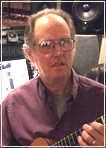
As an Author and Publisher I created Curt Sheller Publications in 1998 as a small publishing company catering to the needs of musicians, guitar players and ukulele players worldwide. Curt Sheller Publications provides for the resources and information to develop as a musician. Curt Sheller has over 40 years of playing experience, 20 plus years of teaching experience and publishing for over 10 years. As a Musician I have over 40 years playing experience in a variety of styles and s settings, most notably jazz. As a Private Music Teacher and *Educator Curt maintains a teaching schedule averaging between 40 and 60 private students a week.



"Byron Yasui" has been on the music faculty at theUniversity of Hawaii in his native Honolulu since 1972, where he teaches music theory, composition, and jazz improvisation. His experiences as a classroom instructor of 'ukulele include workshops at the Ukulele Hall of Fame Museum Expositions of 2001, 2002, and 2003 (all on the east coast), the 2004 UkeFestWest in Santa Cruz, California, the Ukulele Guild of Hawai'i" annual conventions of 2002, 2003, and 2004, countless workshops at the University of Hawai'i Windward Community College since 2002, the Aloha Music Camps of 2004 and 2005 (Molok'i), and various one day workshops on all of the Hawaiian islands since 2000. Many of these workshops were tied in with his participation as an `ukulele soloist in concerts at the various venues.


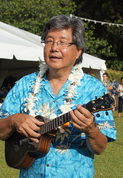
Uncle Glen was born a long time ago on O'ahu. His family lived in Lanikai at first, but moved to a tiny house with a huge yard on the beach in Kailua with 100 coconut trees lining the driveway. He then moved to Kaua'i when he was in the second grade. He lived in Kilauea, Kaumakani, Kekaha, and Waimea on Kaua'i and spent a lot of time in a family cabin in Koke'e. His first musical instrument was the ukulele. Charlie Kaneyama used to come to the elementary schools on the west side of Kaua'i after school to teach ukulele. He remembers listening to the kanikapila sessions under the hau tree near Poipu Beach on Sundays. He didn't play much Hawai'ian music until he arrived on the East Coast the second time. He then really started playing a lot when his kids starting dancing hula with Halau O 'Aulani. That's where the Aloha Boys were born. Glen has been in the Washington, D.C.area (this time) since 1986. His wife, Donna, and two daughters, Ashley Hokunani Spaulding and Amy Melenani, support his Aloha Boys habit. Ashley is a graduate of Virginia Tech and resident of Dallas, Texas. Amy is a recent graduate of Virginia Tech and is traveling the world with Adventures in Mission. Hokunani and Melenani dance the hula for Aloha Boys performances whenever possible. With mixed emotions, Glen retired as an attorney for the U.S. Tax Court in 2012.



Live ‘Ukulele (as in living with your ‘ukulele, not “Live ‘Ukulele” like a concert) was created by two homeschooled students who can’t get enough ‘ukulele and Hawaiian music. The goal of this site is to provide free tabs, lessons, and advice to all levels of ‘ukulele players. Live ‘Ukulele is one of the top 10 ‘ukulele sites in the world


The purpose of the James Hill Ukulele Initiative (JHUI) is to promote and celebrate the ukulele. The JHUI facilitates the teaching and enjoyment of music through educational outreach activities and continuing education programs. The JHUI advocates the use of the ukulele as a platform for music literacy and supports the growth and creation of new ukulele repertoire and approaches to performance.


The Ukulele Way is written, arranged and presented by James Hill.
The Ukulele Way is a musical journey, one that will continue for as long as you have a desire to explore new musical landscapes. The ukulele is your compass; it points the way. The lessons in this method are watering holes along the road, each with something unique to offer.
The Ukulele Way includes a wide array of print, audio and video materials so that you can follow the path that suits your needs, interests and learning style. And while there are many paths, they all have one thing in common: they’re paved with melody, harmony and rhythm.



Ukes in the Classroom - Texas is a non-profit organization founded by Noel Tardy of UkeLady Music to teach Music Literacy - the Ukulele Way and for kids of all ages to have fun!
Music should be a core part of school curriculum. It used to be that way. Due to budget shortfalls and cuts, funding for music and arts have been drastically cut. Considering the high volume of research that confirms music helps kids learn better, it is not a prudent move by the schools. Educator Linda Cole puts it this way, Music and reading are both means of communicating. When children begin to learn language, it is processed in the brain first as sounds. It's through the learning process children begin to understand what is meant by the sound and it is then translated into meanings. Music is an expression (language) of the composer as reading is music (language) created by the writer. Both are ways of communicating thought and emotion and through the learning process, music can make your child a better student.

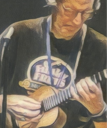
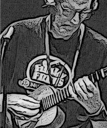
.jpg)